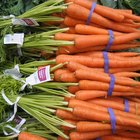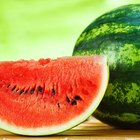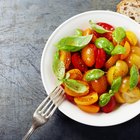
Maybe you simply prefer boiled carrots, or maybe that's the only way your kids will eat them. Either way, you don’t need to worry about losing nutrients. Some nutrients are lost into the boiling water, but they’re not all destroyed and your body actually absorbs more of the carotenoids when carrots are cooked. You can minimize the nutrients lost by using the least amount of water and enjoy your boiled carrots.
Losses from Boiling
Varying percentages of almost all nutrients will leach out of your carrots and into the boiling water. Minerals hold up the best; you’ll only lose 5 percent of most minerals, except for potassium. About 10 percent of the potassium leaches into the water, according to the US Department of Agriculture. Since water-soluble vitamins dissolve in water, they’re more vulnerable, especially vitamin C and folate. Carrots lose 30 to 35 percent of both vitamins during boiling. Other water-soluble vitamins -- thiamine, riboflavin, niacin and B-6 -- only lose 5 to 20 percent.
Cooking Benefits
Even when they’re boiled, carrots are still excellent sources of the vitamin A your family needs for healthy eyes and skin. Since it’s fat-soluble, only 10 percent of vitamin A leaches into the water. More significantly, the vitamin A in carrots is in the form of compounds called carotenoids, which your body absorbs better when carrots are cooked, according to the Linus Pauling Institute. Just 1/2 cup of boiled and drained carrots supplies 13,286 international units of vitamin A. Adults need more than children or teens and that amount represents more than 400 percent of the recommended daily allowance for adults.
Nutrients Retained
Since the Institute of Medicine determines the recommended daily allowance for nutrients according to age and sex, it can be a chore to keep up with the nutrients everyone in your family consumes from boiled carrots. You can check the Institute of Medicine's guidelines for each nutrient, but as a general rule, if the adults are getting a reasonable amount, then the children gain even more. Fiber is not lost during boiling, so 1/2 cup of boiled carrots supplies 9 percent of the recommended daily intake for women and 6 percent for men. The same portion of boiled carrots has at least 7 percent of an adult's daily vitamin K, 5 percent of vitamin B-6, 4 percent of potassium and 3 percent of vitamin C.
Ways to Minimize Loss
Minimize the loss of nutrients by boiling carrots in the smallest amount of water and cooking them for the shortest time possible. If you cook the carrots unpeeled, fewer nutrients will leach into the water. Don’t cut them into small slices because that creates a larger surface area and more nutrients will escape. When you’re cleaning the carrots, don’t soak them in water because nutrients will leach into cold water. Save the nutrient-rich cooking water and use it in soups and stews. If your children don't like carrots, puree the boiled carrots with some of the cooking water and mix it into tomato sauce, chili, macaroni and cheese or even whole-wheat pancakes.
Related Articles

Steaming vs. Boiling vs. Baking Carrots

The Impact of Cooking Broccoli

Loss of Vitamin C Content From Cooking ...

How to Store Carrots in the Refrigerator

How to Cook Carrots Like French Fries

Are the Nutrients Lost in Slow Cooking?
How to Cook Raw Carrots in the Microwave

How to Steam Vegetables in an Electric ...

Does Boiling Fruits Destroy Vitamins?

How to Glaze or Sweeten Canned Carrots

How to Freeze Fresh Asparagus

The Average Weight of a Boiled Egg

How to Freeze Carrots Without Blanching

How to Freeze Cooked Carrots

How to Freeze Carrots & Turnips
Does Slow Cooking Take Nutrients Out of ...

List of Foods With a High Water Content

Vitamins for Fair Skin

Do Bananas Have More Vitamin C Than ...

Nutritional Content of Steamed ...
References
- USDA Agricultural Research Service: USDA Table of Nutrient Retention Factors
- USDA Nutrient Data Laboratory: Carrots, Cooked, Boiled, Drained, Without Salt
- Linus Pauling Institute: Vitamin A
- Linus Pauling Institute: Carotenoids
- Baylor College of Medicine: Cooking Suggestions Can Help Preserve Vitamins, Minerals
- University of Kentucky Cooperative Extension Service: Preserving Nutrients in Food
- Institute of Medicine: Dietary Reference Intakes
Writer Bio
Sandi Busch received a Bachelor of Arts in psychology, then pursued training in nursing and nutrition. She taught families to plan and prepare special diets, worked as a therapeutic support specialist, and now writes about her favorite topics – nutrition, food, families and parenting – for hospitals and trade magazines.
Photo Credits
Adam Gault/Digital Vision/Getty Images